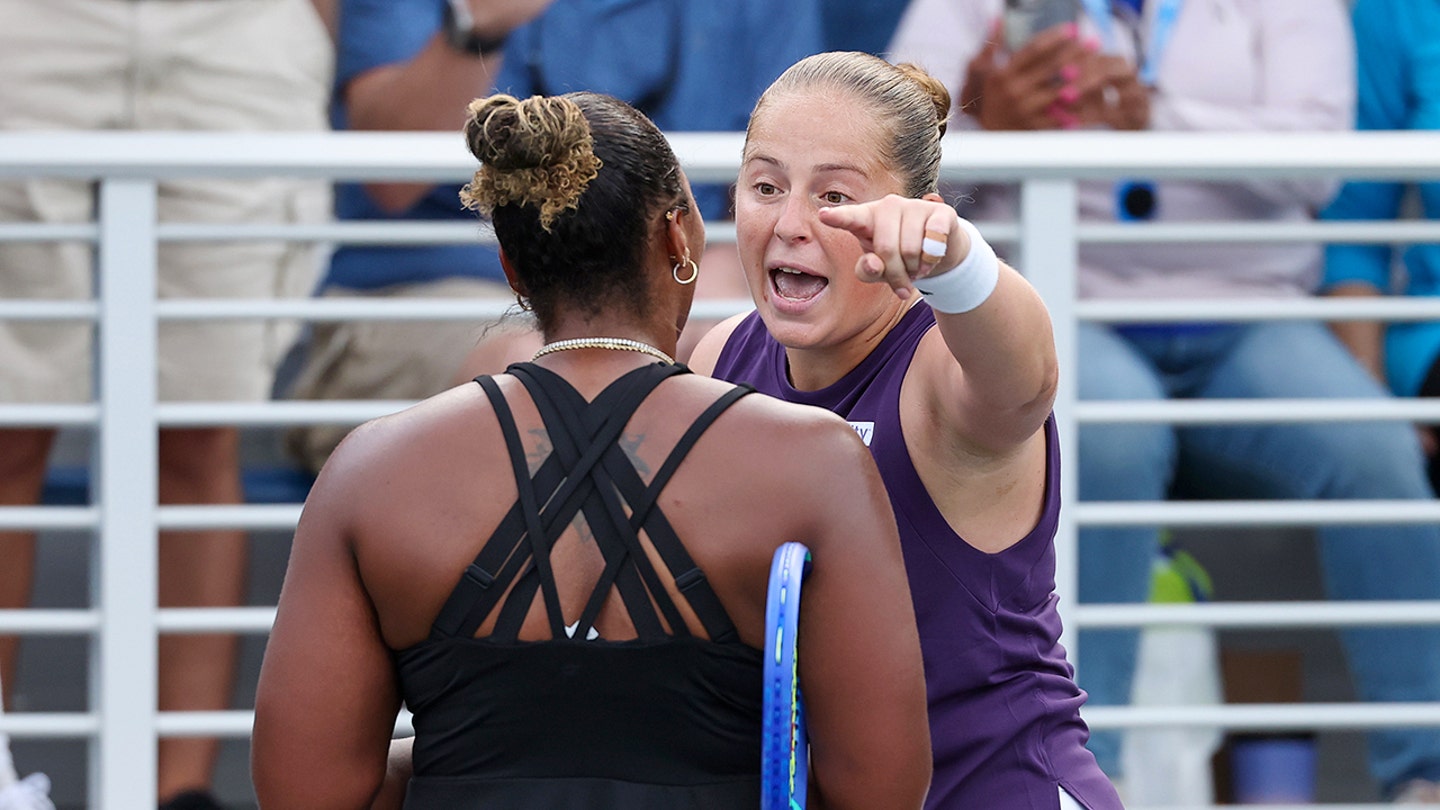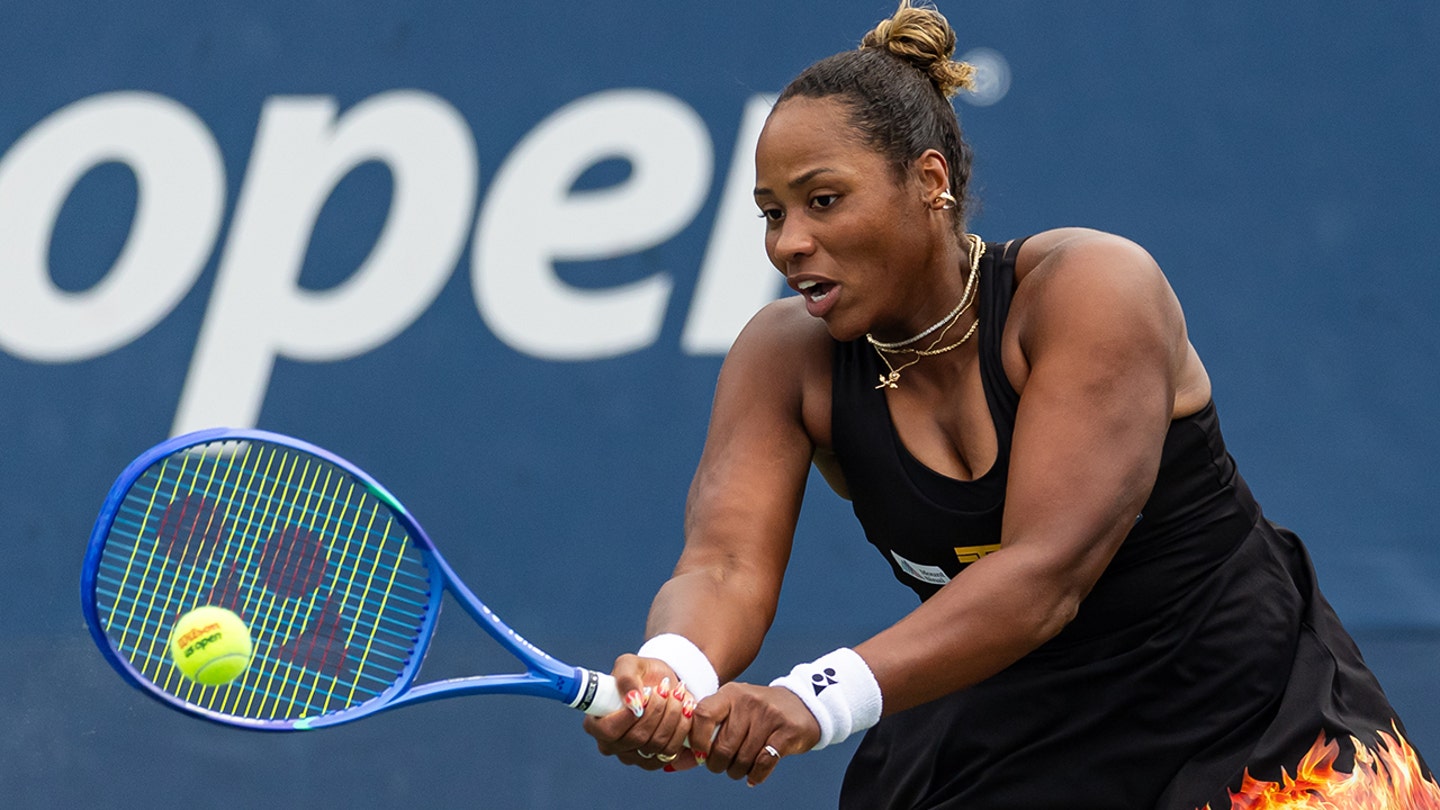
Tennis star Jelena Ostapenko apologizes on social media for remarks toward Taylor Townsend at US Open
Entities mentioned:
- Jelena Ostapenko: Self-preservation, Pride, Righteousness
- Taylor Townsend: Professional pride, Self-respect, Determination
- U.S. Open: Professional pride, Competitive spirit
Article Assessment:
Credibility Score: 75/100
Bias Rating: 45/100 (Center)
Sentiment Score: 35/100
Authoritarianism Risk: 20/100 (Strongly Democratic)
Bias Analysis:
The article presents a balanced view, including perspectives from both players and contextual information. It avoids overtly partisan language, maintaining a neutral stance while addressing sensitive topics.
Key metric: Social Cohesion and Racial Equality
As a social scientist, I analyze that this incident highlights the complex interplay between sportsmanship, cultural differences, and racial sensitivity in professional sports. Ostapenko's initial outburst and subsequent apology demonstrate the challenges of cross-cultural communication in high-pressure environments. Townsend's measured response reflects a broader societal context of racial stereotypes and the ongoing struggle for equality. The incident's public nature and media coverage amplify its potential impact on social cohesion and perceptions of racial dynamics in sports. This event may contribute to broader discussions about etiquette, respect, and racial sensitivity in professional athletics, potentially influencing policies and awareness programs in tennis and other sports.

Tempers are flaring on a daily basis at the US Open. But why?
Entities mentioned:
- Jaume Munar: Justice, Professional pride, Self-respect
- Zizou Bergs: Self-preservation, Professional pride, Indignation
- Peyton Stearns: Self-respect, Professional pride, Duty
- Anna Kalinskaya: Respect, Professional pride, Indignation
- Taylor Townsend: Self-respect, Professional pride, Unity
- Jelena Ostapenko: Moral outrage, Pride, Self-respect
- Stefanos Tsitsipas: Indignation, Professional pride, Justice
- Daniil Medvedev: Moral outrage, Professional pride, Indignation
- Jessica Pegula: Professional pride, Duty, Wariness
- Coco Gauff: Professional pride, Duty, Wariness
- Naomi Osaka: Professional pride, Self-respect, Wariness
Article Assessment:
Credibility Score: 75/100
Bias Rating: 50/100 (Center)
Sentiment Score: 35/100
Authoritarianism Risk: 20/100 (Strongly Democratic)
Bias Analysis:
The article presents a balanced view, including perspectives from multiple players and describing incidents involving various nationalities. It doesn't appear to favor any particular side in the conflicts, maintaining a neutral stance.
Key metric: Social Cohesion
As a social scientist, I analyze that this article highlights a growing tension and lack of sportsmanship at the US Open tennis tournament, potentially impacting social cohesion within the sport. The repeated incidents of confrontations between players over perceived disrespect or unsportsmanlike conduct suggest a breakdown in the traditional etiquette of tennis. This trend could have broader implications for the sport's culture and public perception. The players' explanations, citing factors such as the intense New York atmosphere, end-of-season pressure, and heightened emotions, provide insight into the complex interplay of environmental and psychological factors affecting athlete behavior. This situation may require tennis governing bodies to reassess and potentially strengthen guidelines around player conduct and conflict resolution to maintain the sport's integrity and positive public image.

‘It’s bigger than me:’ Taylor Townsend stuns world No. 5 to reach US Open fourth round after Jelena Ostapenko controversy
Entities mentioned:
- Taylor Townsend: Determination, Self-respect, Professional pride
- Mirra Andreeva: Competitive spirit, Ambition
- Jelena Ostapenko: Indignation, Pride, Competitive spirit
- Naomi Osaka: Justice, Unity, Moral outrage
- Barbora Krejčíková: Ambition, Competitive spirit
Article Assessment:
Credibility Score: 75/100
Bias Rating: 45/100 (Center)
Sentiment Score: 65/100
Authoritarianism Risk: 20/100 (Strongly Democratic)
Bias Analysis:
The article presents a balanced view of the incident, including perspectives from multiple parties involved. While it gives more space to Townsend's viewpoint, it also includes Ostapenko's explanation, maintaining a relatively neutral stance.
Key metric: Social Cohesion and Equality
As a social scientist, I analyze that this article highlights ongoing issues of racial tensions and sportsmanship in professional tennis. The controversy between Townsend and Ostapenko, and Osaka's subsequent comments, underscore the complexities of race relations in a predominantly white sport. Townsend's performance and her metaphorical use of the phoenix symbol represent resilience and transformation in the face of adversity. This incident may contribute to broader discussions about racial sensitivity and etiquette in international sports, potentially influencing policies and awareness programs to promote inclusivity and respect among athletes.

Why the missing of a common act of tennis sportsmanship led to heated on-court argument at the US Open
Entities mentioned:
- Taylor Townsend: Competitive spirit, Pride, Self-preservation
- Jelena Ostapenko: Moral outrage, Indignation, Professional pride
- Svetlana Kuznetsova: Duty, Professional pride
- Aryna Sabalenka: Indignation, Competitive spirit
- Amanda Anisimova: Competitive spirit, Determination
- Rafael Nadal: Professional pride, Righteousness
- Robin Söderling: Pride, Self-respect
Article Assessment:
Credibility Score: 75/100
Bias Rating: 50/100 (Center)
Sentiment Score: 40/100
Authoritarianism Risk: 25/100 (Generally Democratic)
Bias Analysis:
The article presents a balanced view, including perspectives from multiple players and historical context. It doesn't appear to favor either side of the debate, presenting both the importance of sportsmanship and the competitive nature of professional tennis.
Key metric: Social Cohesion
As a social scientist, I analyze that this article highlights the tension between unwritten social norms and competitive drive in professional sports. The incident at the US Open between Townsend and Ostapenko underscores how cultural expectations of sportsmanship can conflict with individual players' focus on winning. This clash of values potentially impacts social cohesion within the tennis community and beyond, as it raises questions about the importance of courtesy versus competitive advantage. The article's exploration of similar incidents in tennis history suggests this is a recurring issue that challenges the sport's etiquette and potentially influences public perception of athletes' character and the sport's values.

Naomi Osaka on Ostapenko’s comments to Townsend: ‘One of the worst things you can say to a Black tennis player’
Entities mentioned:
- Naomi Osaka: Justice, Unity, Moral outrage
- Taylor Townsend: Professional pride, Self-respect, Determination
- Jelena Ostapenko: Indignation, Pride, Competitive spirit
- Aryna Sabalenka: Unity, Empathy, Professional pride
Article Assessment:
Credibility Score: 75/100
Bias Rating: 45/100 (Center)
Sentiment Score: 35/100
Authoritarianism Risk: 25/100 (Generally Democratic)
Bias Analysis:
The article presents multiple perspectives, including those of Osaka, Sabalenka, and Ostapenko's explanation. It maintains a relatively neutral tone, reporting statements without overtly favoring any side.
Key metric: Racial Equality in Sports
As a social scientist, I analyze that this incident highlights ongoing racial tensions in professional tennis. Ostapenko's comments to Townsend, perceived as racially insensitive, have sparked a broader conversation about race relations in a predominantly white sport. Osaka's response underscores the impact of such language on Black athletes, while Sabalenka's attempt to mediate shows a desire for unity within the tennis community. This event may lead to increased scrutiny of player conduct and potentially drive initiatives for greater racial sensitivity and inclusion in professional tennis.

American Taylor Townsend says she was told she has 'no class, no education' by opponent after US Open win
Entities mentioned:
- Taylor Townsend: Determination, Self-respect, Professional pride
- Jelena Ostapenko: Moral outrage, Pride, Self-preservation
- US Open: Competitive spirit, Recognition, Professional pride
Article Assessment:
Credibility Score: 75/100
Bias Rating: 45/100 (Center)
Sentiment Score: 35/100
Authoritarianism Risk: 20/100 (Strongly Democratic)
Bias Analysis:
The article presents both sides of the conflict, quoting both players and providing context. It maintains a relatively neutral stance, though there's slightly more detail from Townsend's perspective.
Key metric: Social Cohesion
As a social scientist, I analyze that this incident highlights ongoing tensions in professional sports related to race, sportsmanship, and cultural differences. The confrontation between Townsend and Ostapenko, stemming from perceived breaches of etiquette and escalating to accusations of classism and lack of education, reflects broader societal issues. This event may impact social cohesion by bringing attention to racial undertones in competitive environments and the different interpretations of sportsmanship across cultures. The public nature of the dispute and its coverage in media could influence public discourse on race relations in sports, potentially affecting social dynamics beyond tennis.

American Taylor Townsend told she has 'no class, no education' by opponent after US Open upset win
Entities mentioned:
- Taylor Townsend: Competitive spirit, Self-respect, Professional pride
- Jelena Ostapenko: Pride, Indignation, Self-preservation
- US Open: Professional pride, Recognition, Legacy
Article Assessment:
Credibility Score: 75/100
Bias Rating: 45/100 (Center)
Sentiment Score: 35/100
Authoritarianism Risk: 20/100 (Strongly Democratic)
Bias Analysis:
The article presents both sides of the incident, quoting both players and providing context. It maintains a relatively neutral tone, though it gives slightly more space to Townsend's perspective, which is balanced by including Ostapenko's social media response.
Key metric: Racial Equality in Sports
As a social scientist, I analyze that this incident highlights ongoing tensions surrounding race and sportsmanship in professional tennis. The confrontation between Townsend and Ostapenko, particularly the alleged comments about 'class' and 'education', touch on sensitive racial stereotypes. Townsend's response demonstrates a measured approach to addressing potential racial undertones while maintaining focus on her athletic performance. This event may contribute to broader discussions about racial dynamics in tennis and potentially influence efforts to promote inclusivity and respect within the sport.